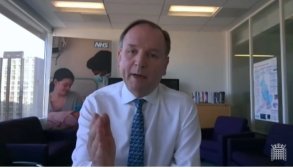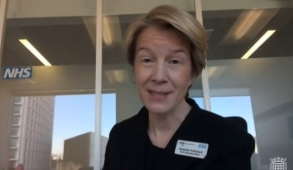NHS has ‘expectation’ of increased Covid funds
Speaking to the Commons Health and Social Care Committee this week, the NHS England chief executive Simon Stevens (pictured) acknowledged that the Budget had confirmed the previously agreed long-term funding settlement for the NHS. The chancellor’s spending review last November had also provided additional funding to make a start on catching up on the backlogs of care that have arisen as a result of Covid.
‘In addition to that, during the course of this past year, the NHS has been provided with the extra costs of looking after Covid patients and all of the indirect consequences for Covid care,’ he said. ‘And, given that the majority of Covid hospitalised patients that we’ve been looking after have actually been admitted since that November spending review – we’ve obviously had an incredibly tough December, January and February across the health service.
‘There are going to be continuing Covid-related needs and costs spilling into the new financial year,’ he added. ‘The expectation is that the NHS will receive additional funding to cover those unavoidable Covid costs, certainly into the first half of the year.’ Sir Simon added that this was the approach that the chancellor had already set out for NHS Test and Trace, which has been allocated funds for next year.
According to the Budget, NHS England core funding will increase to £136bn in 2021/22 from £130bn in 2020/21. At the same time there will be a reduction in separately identified Covid-19 funding from £18bn to £3bn. Taking one year with the next, this equates to an overall cut in NHS England funding of £8.6bn.
Sir Simon was asked if he was surprised further increases were not announced in the Budget. ‘There is an urgent need now to give that funding certainty to hospitals and local frontline services and the beginning of the financial year is hoving into view,’ he told the committee. ‘So, we do expect it will be resolved very shortly.’ Alternatively, given the uncertainties, he suggested the secretary of state could provide ministerial direction to give some flexibility for those elements of costs that aren’t fully predictable. Both options were viable, he added.
Following the government’s recommendation of a 1% pay rise for NHS staff last week, Sir Simon confirmed that the original working assumption was that there would be 2.1% available for the cost of Agenda for Change staff pay increases in 2021/22. He acknowledged that the position has changed since those assumptions were made. But as head of the health service he wanted to see ‘properly rewarded NHS staff, particularly given everything they have been through in the last year’.
‘The right way to resolve this is the path the government has actually set out, which is to ask the pay review bodies to look at all the evidence in the round and independently make a fair recommendation,’ he said. While he could also see the attraction of a one-off bonus, he said staff wanted to see a broader range of measures introduced, including an increase in workforce numbers to help meet patient demand and activity.
There have been calls for the introduction of independent assessment of future staffing requirements so that staff could be trained in the right numbers to meet future demand. And Sir Simon said he saw the merit in this proposal. ‘To some extent, the future is already set by decisions made in the recent past,’ he said. ‘Last year’s intake of undergraduates into medical school, will be the number of new doctors in five years’ time. But the way the budgets for Health Education England get set is a rolling annualised process, which rather ignores the fact that those decision have been made.’
He said the service should capitalise on the surge of interest in working for the health service over the last year and explore what is needed for the next five to 10 years would make sense.
In a previous hearing, the committee had been told workforce shortages cost the service more than training the right number of staff in the first place, because of the premium paid for agency and temporary workers. Amanda Pritchard (pictured), NHS chief operating officer and NHS Improvement chief executive, said she completely agreed with this view. The former chief executive of Guy’s and St Thomas’s NHS Foundation Trust said there was both a financial and patient safety angle.
‘When we look at the time it takes to train in particular, the idea that we could plan workforce on an annual basis just doesn’t really make sense,’ she said. ‘So, the ability to move to a longer-term plan for workforce, with much more surety around that and some safeguards around how that is reported, feels eminently sensible.’
The hearing was held as part of the committee’s inquiry into the government white paper on integration, which will see 42 integrated care systems created as statutory bodies. Guidance will be issued on governance issues, such as the composition of boards, but the aim is to provide a permissive framework.
‘We tried to suggest in our recommendations to government the minimum you’d expect to see around governance – both in terms of the ICS body and the relationship with the health and care partnership,’ she said. ‘But we would absolutely expect to give people, within that permissive framework, some guidance.
‘One of the things we are really clear about is the importance of clinical leadership through the whole of the NHS and that is as true for primary care networks or individual organisations as it will be for ICSs. But we are keen to steer away from being over-prescriptive about exactly what that will look like at local level. There are some examples of where things are working incredibly well now and we don’t want to stop people building on that success.’
Related content
The value masterclass shares examples of organisations and systems that have pursued a value-driven approach and the results they have achieved.
This webinar series offers colleagues of ICS organisations the opportunity to discuss common priorities, challenges, and successes within their field.